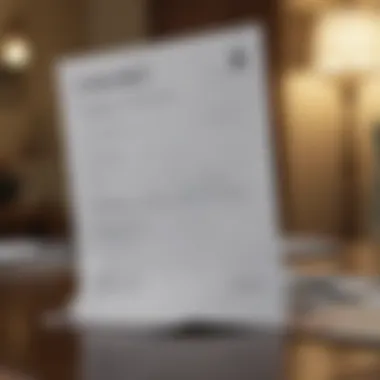Understanding PNC Certified Checks: A Comprehensive Guide


Intro
PNC certified checks serve a significant role in the landscape of financial transactions. Understanding their function and benefits can help individuals navigate transactions with confidence. This guide aims to shed light on what certified checks are, particularly those offered by PNC Bank, and how they differ from other payment methods. The goal is to provide clarity for those contemplating the use of a certified check, emphasizing the practicalities and associated responsibilities.
Certified checks are not merely a payment instrument; they also provide a layer of security and assurance that personal checks often lack. They are backed by the issuing bank, thus ensuring the payee that the funds are reserved and available. This distinct characteristic makes them particularly valuable in larger transactions. For both young professionals making important purchases and families dealing with significant expenses, understanding the certification process, fees, and overall utility of these checks is essential.
This article will explore the various components of utilizing PNC certified checks. It will cover everything from obtaining a certified check to the potential risks and benefits involved. Let's delve deeper into the details.
Prologue to PNC Certified Checks
Certified checks play a significant role in the world of financial transactions, particularly for those seeking reliability and assurance in their dealings. This section will outline the importance of understanding PNC certified checks, highlighting their specific elements, benefits, and considerations.
Definition of a Certified Check
A certified check is a type of check where the bank verifies that the funds are available and sets them aside for the recipient. When you request a certified check from PNC, the bank guarantees payment upon presentation. This assurance makes certified checks a preferred method for significant transactions such as buying property, vehicles, or paying for large services.
The process involves a few steps. First, the account holder submits a check to the bank; then, the bank authenticates it and confirms the availability of funds. This not only secures the payment for the payee but also aids the payer by establishing a record of the transaction, which may be useful for future reference.
Purpose and Use Cases
Certified checks serve several purposes, particularly in scenarios where trust and security are paramount. Here are a few typical use cases:
- Real Estate Transactions: In property deals, buyers often use certified checks as earnest money, demonstrating their commitment and financial capability.
- Major Purchases: For significant acquisitions, like automobiles or appliances, sellers prefer certified checks due to their assurance of payment.
- Security Deposits: Landlords typically request certified checks as security deposits because it guarantees that the funds are available, reducing the risk of bouncing checks.
With the inherent credibility of certified checks, individuals and businesses can navigate high-stakes financial dealings with confidence. Understanding their purpose and proper usage is essential for anyone involved in substantial monetary interactions.
Benefits of Using PNC Certified Checks
The significance of PNC certified checks lies in their reliability and efficiency as a payment method. This section explores several key benefits that make certified checks an appealing choice for individuals and businesses alike. Whether it's about proving funds or enhancing security, understanding these advantages serves as a foundation for informed financial decisions.
Proof of Funds
One major advantage of PNC certified checks is that they provide proof of funds. This is crucial for situations where guarantee of payment is essential, such as in real estate transactions or larger purchases. When a certified check is issued, the funds are withdrawn from the account immediately, securing the amount until the check is cashed.
This aspect assures the recipient that the payment is guaranteed, reducing the risk of bounced checks. In many cases, individuals may find themselves in situations where demonstrating financial reliability is necessary. A certified check acts as a safeguard for both parties involved in a transaction. Therefore, having this form of payment can streamline negotiations and enhance trust.
Security Features
Security is another critical benefit of PNC certified checks. They come with advanced security features that help prevent fraud. These features often include watermarks, microprinting, and specialized ink that are not easily replicable. This reduces the risk of counterfeiting, enabling both parties to perform transactions confidently.
Moreover, these checks are often closely monitored by financial institutions. Such oversight further acts as a deterrent to fraudulent activity. When considering a payment method, the security of funds during transactions should not be overlooked. The heightened security surrounding certified checks helps address concerns related to theft and unauthorized use.
Widely Accepted Payments
Lastly, PNC certified checks are widely accepted across various sectors. They are considered a reliable form of payment by many businesses, local governments, and financial institutions. This broad acceptance makes them a versatile option for different transactions. From paying for deposits to making significant purchases, individuals can use certified checks with greater assurance that their payment will be recognized and honored.
The convenience of having a payment method that is accepted by many organizations cannot be overstated. This aspect plays a significant role in daily financial activities, making PNC certified checks a practical choice for both personal and business needs.
"The value of using certified checks lies not just in their convenience but also in the trust they build between transaction parties."


Difference Between Certified Checks and Other Payment Types
Understanding the differences between certified checks and other payment types is vital for anyone looking to make secure transactions. This knowledge can empower users to select the most appropriate method for their financial needs. Each type of payment comes with its own set of characteristics, security features, and purposes. This section seeks to clarify these distinctions by comparing certified checks to personal checks, cashier’s checks, and money orders.
Certified Check vs. Personal Check
A certified check carries a significant advantage over a personal check. When a bank certifies a check, it guarantees that the funds are available in the account from which the check is drawn. This gives the payee confidence that the funds will not bounce. Personal checks, however, can often lack this security. As a result, they can be subject to insufficient funds if the account holder does not have the necessary balance at the time of cashing.
- Secured funds: With a certified check, the bank verifies the authenticity of the funds. A personal check does not offer this same assurance.
- Usage: Certified checks are ideal for larger transactions, where assurance of payment is crucial. Personal checks are generally suitable for everyday transactions but not advised for large payments.
Certified Check vs. Cashier’s Check
Both certified and cashier’s checks offer a secure means of payment, yet there are subtle differences. A cashier's check is drawn directly from a bank's funds, making it a safer option for large transactions. The bank assumes responsibility for the payment, as the cash is already deducted from the buyer's account.
- Source of funds: A certified check verifies that the funds are available in the buyer's account before issuing the check. A cashier's check uses the bank's funds, which offers inherent security for the recipient.
- Fees: Obtaining a certified check generally involves a fee, though it may be lower compared to the fee for a cashier's check. It's vital to factor in these costs when deciding on a payment method.
Certified Check vs. Money Order
Money orders provide a method for guaranteed payment similar to certified checks, but there are notable distinctions. They often come with lower limits. Money orders might be more accessible than certified checks, as they can be acquired at various locations, including convenience stores or post offices.
- Transaction limit: Money orders typically have a limit of $1,000 or less, making them less ideal for large transactions. Certified checks can be issued for much larger amounts.
- Tracability: Certified checks are tied to your bank account and offer easy tracking through the financial institution. Money orders, while secure, can sometimes lead to challenges with tracing if purchased outside of a bank.
Understanding the differences between these payment methods can help you select the right one for your needs. Keep in mind the importance of security and transaction size when making a decision.
In summary, while PNC certified checks offer several advantages, it is essential to weigh them against other payment types. Each method serves a unique purpose and understanding these can help greatly in making informed financial decisions.
Process of Obtaining a PNC Certified Check
The process of obtaining a PNC Certified Check is a crucial aspect outlined in this article. Understanding this process is significant for anyone looking to engage in large transactions securely. A certified check represents a promise of payment that is backed by the issuing bank, making it a reliable payment method. However, the steps to acquire one must be followed diligently to ensure accuracy and effectiveness.
Steps to Request a Certified Check
Requesting a certified check from PNC is structured and straightforward. The first step is to visit a local PNC branch or access their online banking platform.
- Visit a Branch: If you choose the in-person route, ask the bank teller for a certified check request. Ensure you have the necessary information related to the payee.
- Online Request: Alternatively, through online banking, navigate to the appropriate section and fill out the request form. This option is convenient for many users.
- Provide Payment Details: You must specify the amount for the certified check and provide details about the recipient.
Each mode has its own timing and efficiency. The teller can often provide you with immediate services, while online requests may take longer based upon verification needs.
Documents Required
When requesting a PNC Certified Check, you will need important documents to ensure the request is processed without delays. The following documents are generally required:
- Valid Photo ID: A government-issued ID confirming your identity.
- Account Information: It is helpful to have your PNC account number readily available.
- Recipient Details: Information about the payee, including name and address, may also be needed.
Having these documents prepared can expedite the process. Failure to provide the right documents may lead to complications in checking availability for the requested amount.
How to Submit Payment
Once you have requested the certified check, payment must be made effectively. You can submit the payment in several ways:


- Account Deduction: The most common method is through a direct deduction from your PNC account. This is typically seamless if you have sufficient funds.
- Cash Payment: For immediate needs, you might opt to pay in cash at the branch. However, remember to check the maximum amount allowed for cash transactions.
After payment is confirmed, you will receive your certified check. Make sure to verify all details immediately to avoid any mistakes during a transaction.
It is essential to keep the receipt provided after the request as a reference for tracking the certified check if needed.
Fees Associated with PNC Certified Checks
Understanding the fees associated with PNC certified checks is crucial for consumers and businesses alike. Knowing the costs involved can help one make informed financial decisions. Certified checks can be more secure compared to other forms of payment, but it is important to weigh these benefits against any fees that may apply.
Understanding the Fee Structure
When acquiring a certified check from PNC, there are specific fees that customers should be aware of. These typically include a flat fee for issuing the check as well as potential additional charges if you request expedited service. PNC’s fee structure may vary based on the account type you hold. For example, customers with premium checking accounts may receive discounts or even waived fees.
- Standard Issuance Fee: This is a fixed cost for obtaining a certified check. It can vary by state and branch.
- Expedited Service Fee: Some customers may need a check urgently. This could come with an additional cost.
- Account Type Discounts: Certain accounts may offer lower fees.
Having clear knowledge of these fees is necessary for individuals to avoid unexpected costs during their transactions. Customers are encouraged to check PNC's official website or visit their local branch for the most accurate information about fees.
Comparing Fees with Other Banks
It is beneficial to compare PNC’s certified check fees with those of other banks. Not all financial institutions have the same fee structure, and certain banks may offer competitive pricing or additional benefits when processing certified checks.
- Bank of America – Known for its competitive rates for certified checks but may have additional complexities in its fee structure.
- Chase Bank – Offers similar services with a straightforward fee but may have fewer perks for loyal customers.
- Wells Fargo – Also provides certified checks with a slightly higher issuance fee, however, its customer service is often praised.
When assessing the overall value, consider not just the fees but also the customer service quality and convenience of each bank’s process. Questions to ask include: What is the time it takes to receive the check? Are there better rewards for frequent transactions?
"Fee comparison can help one identify the most cost-effective options for certified checks, ensuring that you make the best financial choice."
Ultimately, understanding and comparing these fees will enable individuals and businesses to utilize PNC certified checks effectively and economically.
Security Considerations
Security is paramount when it comes to financial transactions, especially with instruments like PNC certified checks. These checks offer certain protections, but they also come with their own set of vulnerabilities and challenges. It is essential to understand these aspects to effectively manage risks and ensure a smooth transaction process.
Fraud Risks with Certified Checks
Certified checks are often seen as secure due to their guaranteed funds. However, fraud is a risk that cannot be ignored. Criminals may create counterfeit certified checks that appear genuine. These forgeries can lead to substantial financial loss for the recipient. It’s crucial for individuals to be vigilant and recognize that not all transactions involving certified checks are safe.
Common fraud tactics include:
- Counterfeiting: Unscrupulous individuals may produce fake checks in an attempt to defraud sellers.
- Check washing: This technique involves removing or altering the details on a legitimate check to commit fraud.
- Third-party schemes: Some scammers impersonate legitimate institutions, offering checks that are fraudulent.
In light of these risks, it is vital to ensure that you are transacting with trustworthy parties and to verify the legitimacy of the check before accepting it.
How to Verify a Certified Check
When receiving a certified check, verification is a crucial step. Here are some effective methods to confirm the authenticity of the check:
- Contact the Issuing Bank: Reach out to PNC directly using the phone number found on their official website, not the one printed on the check itself. Bank representatives can confirm whether the check is valid.
- Examine the Check: Look for security features such as watermarks, microprinting, and color-shifting inks. These features can often indicate a legitimate check.
- Check the Dates: Ensure that the check is dated correctly. A check that is post-dated or lacks a date can be suspicious.
- Assess the Amount: Be cautious if the check amount is significantly higher than what was agreed upon. This could be a red flag in a potential scam.
- Verify Payor Information: Ensure that the company or individual who issued the check is legitimate. Research them online or check their business credentials.


"Always act with caution when dealing with certified checks, and take the time to verify their legitimacy."
By following these verification steps, individuals can better protect themselves against fraud and make informed decisions when handling certified checks.
Use Cases for PNC Certified Checks
PNC certified checks serve as a pivotal financial instrument for various significant transactions. Their reliability and security features make them ideal for specific situations where trust and verification are crucial. Understanding the practical applications of certified checks helps individuals make informed decisions when handling large sums of money. Below are detailed cases showcasing the importance of PNC certified checks in real estate transactions, large purchases, and security deposits.
Real Estate Transactions
In real estate transactions, certified checks hold substantial importance. When buying or selling property, a certified check demonstrates proof of funds. Sellers often require a verified payment method to ensure that buyers have the financial capability to complete the transaction.
Using a certified check can expedite the closing process. This is crucial in competitive markets where speed is vital. A traditional personal check might not be adequate due to the risk of insufficient funds or payment holds, whereas a PNC certified check is guaranteed by the bank. Additionally, it helps to eliminate any potential disputes related to payment along the way.
Large Purchases
Large purchases often involve a significant amount of money. When dealing in high-value transactions, such as purchasing a vehicle or making a substantial investment, ensuring payment security is vital. PNC certified checks provide a level of assurance for both parties involved.
For buyers, utilizing a certified check assures sellers that the funds are available and that payment won’t bounce. This can sometimes encourage negotiation in terms of price or conditions of sale. Sellers benefit by having a guaranteed form of payment that does not carry the same risks associated with personal checks. Additionally, many businesses and individual sellers prefer certified checks over other forms of payment due to their enhanced verifiability.
Security Deposits
Security deposits are another common use case for PNC certified checks. Typical situations include leasing apartments or securing services like event venues. Many landlords and service providers prefer certified checks for security deposits because they ensure that funds will not be disputed after the transaction.
A certified check reassures the recipient that the funds are secured and available for immediate withdrawal. This factor is especially crucial in rental agreements where the potential for disputes can arise over payment. Using a PNC certified check minimizes administrative burdens and enhances trust in landlord-tenant relationships.
"PNC certified checks provide peace of mind in critical financial transactions, safeguarding the interests of all parties involved."
In summary, the use cases for PNC certified checks span various domains. Whether for real estate, large purchases, or security deposits, their role in offering reliability and assurance cannot be overstated. As young professionals, families, or students engage in significant financial dealings, understanding these applications is essential.
Common Questions about PNC Certified Checks
Understanding the various aspects of PNC certified checks can aid individuals and businesses in making informed financial decisions. This section addresses common queries surrounding certified checks, focusing on scenarios that might arise post-purchase. The ability to navigate concerns such as lost checks and cancellation processes can assure users about the safety and manageability of certified checks in their financial dealings. These practical insights help ensure that individuals approach the usage of certified checks with confidence.
What If the Check Is Lost?
Losing a certified check can provoke anxiety. However, it’s important to know that there are steps you can take. If a certified check is lost, you should report it to PNC immediately. The bank will guide you through the process to prevent fraud and protect your funds. PNC may require you to complete a declaration of loss, which is a formal statement declaring the check is missing. This step helps establish a record of the loss. It is also advisable to monitor your account closely for any suspicious activity.
Once you report the loss, PNC will typically conduct an investigation to verify the status of the check. If the check has not been cashed, the bank may allow you to request a replacement check. Be mindful that a fee may apply for issuing a replacement. It is essential to keep accurate records of all notifications and communications with the bank.
Can You Cancel a Certified Check?
Cancelling a certified check is possible, but it can be complicated. Unlike personal checks, certified checks provide assurance of funds, making cancellation more stringent. If you find yourself in a situation where you need to cancel the check, the first course of action should be to contact PNC.
When you reach out, be prepared to provide details such as the check number, the amount, and the name of the payee. In many cases, if the check has not been cashed, the bank can assist you in cancelling it. However, once a check is cashed, cancellation is not feasible since the funds have already been transferred. Depending on the bank's policy, you may also need to complete forms or provide a written request to cancel the certified check.
End
In the broader context of financial transactions, understanding the significance of PNC certified checks is crucial. As a secure method of payment, certified checks offer both individuals and businesses a reliable way to confirm funds are available, thus easing apprehensions related to personal checks. This final section synthesizes the key elements discussed throughout the article and reinforces their relevance to potential users.
Summary of Key Points
- Purpose: Certified checks serve as a guarantee of payment, providing assurance to the payee about the availability of funds. They are often required in large financial transactions where trust is paramount.
- Process: Obtaining a PNC certified check involves specific steps, including verification of identity and presenting necessary documents. The process is designed to ensure that funds are allocated correctly and securely.
- Security Features: PNC certified checks incorporate various security measures that help prevent fraud, making them a safer option compared to personal checks.
- Use Cases: Common scenarios for using certified checks include real estate transactions, significant purchases, and security deposits where advanced payment is essential.
- Fees and Risks: While there are some fees associated with obtaining a certified check, they are typically minimal compared to the potential risks of fraud associated with less secure payment methods.
Final Thoughts on Using Certified Checks
Using certified checks from PNC can be a pragmatic approach for anyone engaging in significant financial transactions. They not only provide peace of mind due to their reliable nature but also enhance the credibility of the payer. For young professionals and families, PNC certified checks can simplify interactions in important purchases, whether buying a home or securing a rental property. Understanding fees associated with these checks, and comparing them to other banks can also help users make informed decisions. Ultimately, considering the pros and cons, certified checks give users a path to navigate financial commitments with clarity and confidence.







